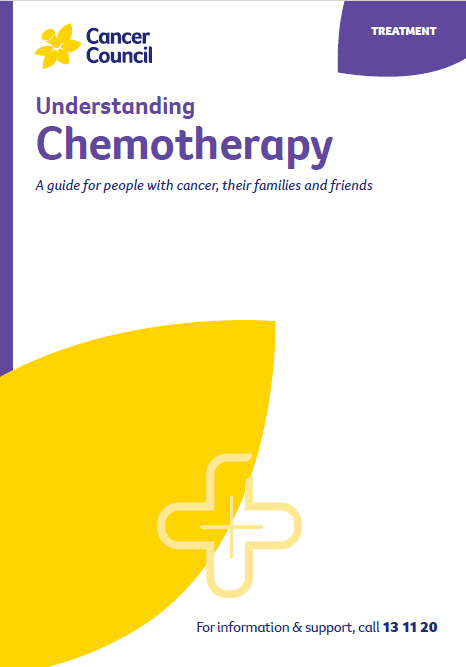- Home
- Oesophageal cancer
- Treatment
- Chemotherapy
Chemotherapy for oesophageal cancer
Chemotherapy uses drugs to kill or slow the growth of cancer cells. The aim is to destroy cancer cells, while causing the least possible damage to healthy cells. Chemotherapy for oesophageal cancer may be given alone or it may be combined with radiation therapy (called chemoradiation).
Learn more about:
- When is chemotherapy used?
- How is it given?
- Side effects of chemotherapy
- Chemoradiation for oesophageal cancer
- Video: What is chemotherapy?
When is chemotherapy used?
For oesophageal cancer, chemotherapy may be used:
- before surgery (neoadjuvant chemotherapy) – to shrink a large tumour and destroy any cancer cells that may have spread
- after surgery (adjuvant chemotherapy) – to reduce the chance of the disease coming back
- on its own (palliative treatment) – for people unable to have surgery or where cancer has spread to different parts of the body.
How is it given?
Chemotherapy drugs are usually given as a liquid through a drip inserted into a vein (intravenous infusion). It may also be given through a central venous access device (CVAD) or as tablets you swallow. You will usually receive treatment as an outpatient. Most people have a combination of chemotherapy drugs over several treatment sessions. There may be a rest period of a few weeks between each treatment session.
For more on this, see our general section on Chemotherapy.
Side effects of chemotherapy
Your treatment team can help you prevent or manage any side effects. Common side effects may include nausea and/or vomiting, appetite changes and difficulty swallowing, sore mouth or mouth ulcers, skin and nail changes, numbness or tingling in the hands or feet, ringing in the ears or hearing loss, changed bowel habits (e.g. constipation, diarrhoea), and hair loss or thinning.
Chemotherapy affects your immune system, so you may also be more likely to catch infections. If you feel unwell or have a temperature of 38°C or higher, seek urgent medical attention.
Chemoradiation for oesophageal cancer
Treatment with radiation therapy and chemotherapy is called chemoradiation. The chemotherapy drugs make the cancer cells more sensitive to radiation therapy.
Oesophageal cancer may be treated with chemoradiation before surgery to shrink the cancer and make it easier to remove. Chemoradiation may also be used as the main treatment when the tumour can’t be safely removed with surgery, or if the doctor thinks the risk with surgery is too high.
If you have chemoradiation, you will usually have chemotherapy a few hours before some radiation therapy appointments. Your doctor will talk to you about the treatment schedule and how to manage any side effects.
You will usually have treatment as an outpatient (when you are not admitted to hospital) once a day, Monday to Friday, for 4–6 weeks. If radiation therapy is used palliatively, you may have a short course of 1–15 sessions. Each treatment takes about 10 minutes and is not painful. You will lie on a table under a machine that delivers radiation to the affected parts of your body. Your doctor will let you know your treatment schedule.
→ READ MORE: Immunotherapy for oesophageal cancer
Video: What is chemotherapy?
Watch this short video to learn more about chemotherapy.
Podcast: Making Treatment Decisions
Listen to more episodes from our podcast for people affected by cancer
Prof David I Watson, Matthew Flinders Distinguished Professor of Surgery, Flinders University, and Senior Consultant Surgeon, Oesophago-Gastric Surgery Unit, Flinders Medical Centre, SA; Prof Bryan Burmeister, Senior Radiation Oncologist, GenesisCare Fraser Coast and Hervey Bay Hospital, QLD; Kieran Cahill, Consumer; Jessica Jong, Clinical Dietitian, Upper GI and Hepatobiliary Services, Peter MacCallum Cancer Centre, VIC; John Leung, Consumer; Prof Rajvinder Singh, Professor of Medicine, University of Adelaide, and Director, Gastroenterology Department and Head of Endoscopy, Lyell McEwin Hospital, SA; Dr Sarah Sutherland, Medical Oncologist, Chris O’Brien Lifehouse, NSW; Paula Swannock, Upper GI Cancer Nurse Consultant, St Vincent’s Hospital Melbourne, VIC; Rebecca Yeoh, 13 11 20 Consultant, Cancer Council Queensland.
View the Cancer Council NSW editorial policy.
View all publications or call 13 11 20 for free printed copies.
